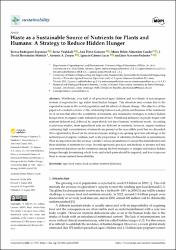/admin/item?itemID=cc7fc354-eb1d-47b3-87b8-8e4b7d31e7f8
Waste as a sustainable source of nutrients for plants and humans : a strategy to reduce hidden hunger

View/
Type of Access
OpenMaterial Type
ArticleType of Content
Scientific researchLanguage
EnglishCollection
- Investigación ambiental [1613]
Metadata
Show full item record| Abstract: | Worldwide, over half of all preschool-aged children and two-thirds of non-pregnant women of reproductive age suffer from hidden hunger. This situation may worsen due to the expected increase in the world population and the effects of climate change. The objective of this paper is to conduct a review of the relationship between soil, plants, and humans at the nutritional level, factors that affect the availability of nutrients, and sustainable strategies to reduce hidden hunger from an organic waste utilization point of view. Nutritional deficiency in people begins with nutrient-deficient soil, followed by crops that do not meet humans’ nutritional needs. According to previous studies, most agricultural soils are deficient in nutrients; however, organic residues containing high concentrations of minerals are present in the non-edible parts that are discarded. New opportunities (based on the circular economy strategy) are opening up to take advantage of the nutrient pool of organic residues, such as the preparation of substrates (technosols) or amendments. Their incorporation into the soil may consider various circumstances to ensure the mineralization and bioavailability of nutrients for crops. Several agronomic practices and methods to monitor soil and crop nutrient depletion can be considered among the best strategies to mitigate and reduce hidden hunger through determining which foods and which parts should be ingested, and how to process them to ensure mineral bioavailability. |
| Author(s): | Rodríguez-Espinosa, Teresa
Voukkali, Irene Pérez-Gimeno, Ana Almendro Candel, María Belén Hernández-Martich, J. David Zorpas, Antonis A. Gómez Lucas, Ignacio Navarro-Pedreño, José |
| Date: | 2024 |
| Published: | Sustainability, 16(16), 7185 |
| Citation: | Rodríguez-Espinosa, T., Voukkali, I., Pérez-Gimeno, A., Almendro Candel, M. B., Hernández-Martich, J. D., Zorpas, A. A., ... & Navarro-Pedreño, J. (2024). Waste as a sustainable source of nutrients for plants and humans: a strategy to reduce hidden hunger. Sustainability, 16(16), 7185. Recuperado de: |
| URI: | https://bvearmb.do/handle/123456789/5100
|

